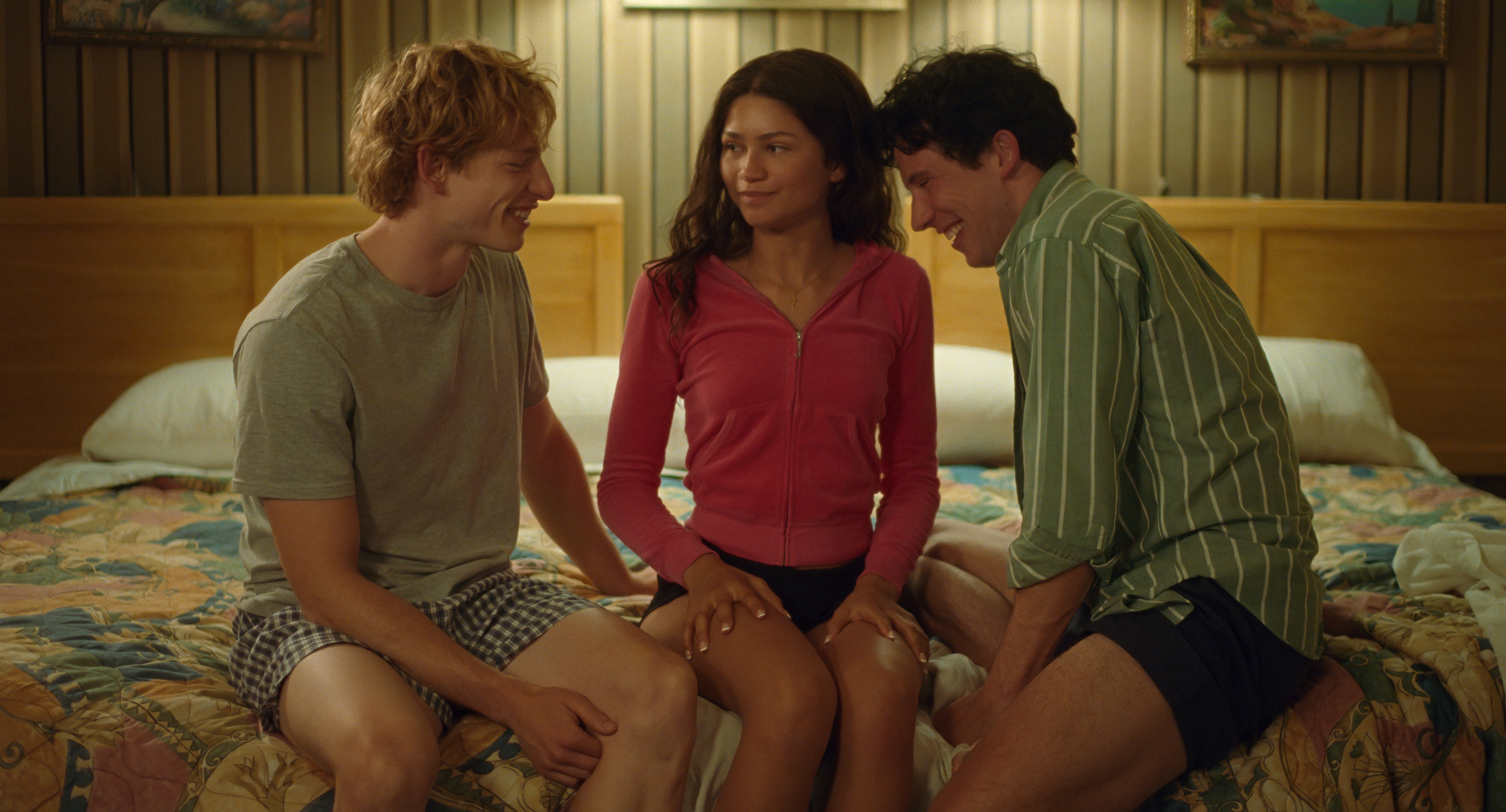Warning: This post contains spoilers for Challengers.
What is it about tennis that reminds directors of sex? Is it the fact that, unlike swimming or golf, the player must look across the net directly at their opponent? Is it the sheer athleticism on display? Is it the obvious love pun in the scoring? Whatever the reason, movies like Wimbledon, Match Point, A Room With a View, and even The Royal Tenenbaums set stories of lust on the tennis court. Usually a major moment in a game serves as metaphor: A ball that hits the net teaches a lesson about luck; an unlikely defeat represents a rocky moment in a relationship; a furtive glance during a match hints at buried feelings.
The new Zendaya movie Challengers is perhaps the horniest film in the genre to date. Players Art (Mike Faist) and Patrick (Josh O’Connor) spend the better part of two nearly decades vying for the affections of one-time tennis phenom Tashi (Zendaya). Their romantic rivalry culminates in a single match laden with erotic subtext, the outcome of which will determine the characters’ romantic futures. Director Luca Guadagnino volleys between the action of the match and flashbacks to the characters’ teenage years. The jumps back and forth in time become ever more erratic as the tension in the match builds. Tashi practically vibrates with each thwack of the ball. Trent Reznor and Atticus Ross’s synth soundtrack crescendos as the boys stretch their long limbs across the court to catch each other’s drop shots.
Read More: Coco Gauff Is Playing for Herself Now
And yet we never learn who actually wins the face-off, let alone Tashi’s heart. Instead, Guadagnino makes a curious decision: He ends the movie not with match point but with an accidental-but-maybe-on-purpose mid-air hug at the net. A hug that thrusts the men together after a long match of lustful looks but no physical contact. A hug that’s more orgasmic than any sex we see in the movie. A hug that defies physics and (probably) the rules of tennis. It’s horny and ludicrous.
But it’s impossible to end a film of this nature any other way. Either man defeating the other would have been anticlimactic because Tashi is not actually the trophy they claim they’re pursuing. The hug makes it clear that two of the three characters are in love—and it’s not the pairing you might expect. And that’s the essence of Challengers: The story of a woman turned on by orchestrating erotic encounters between the men that love her.
The first flashback is key to understanding the drama at the center of this love triangle. We watch as young Art and Patrick—curiously close roommates who geekily call themselves “Fire and Ice”—win the doubles title at the U.S. Open Junior Championships in 2006. Patrick, arguably the better player but less diligent worker, agrees to let Art win their face-off in the singles tournament the next day.
But then the two boys watch the spellbinding Tashi grunt her way to her own juniors title. After flirting with Tashi at a party in her honor, they invite her back to their hotel room. Over a shared beer, Patrick admits that he taught Art how to masturbate. When they’re all sitting on the bed together, she leans back and coaxes—really, coaches—them to reach across her and kiss one another. She smirks.

The boys’ bond begins to fissure when the ultra-competitive Tashi interrupts the make out session to make an indecent proposal: She’ll give her phone number to whomever wins the next day’s match. She then exits the room, insisting she doesn’t want to be a “homewrecker.”
Art and Patrick will spend the rest of their professional tennis careers competing for Tashi’s attention. So much for the bro code. Patrick breaks his promise to Art and wins the U.S. Open match. Later, when Art asks Patrick whether he slept with Tashi, Patrick demurs. He does, however, point out that Art has a habit of placing the ball in the throat of the racquet before he serves. Patrick mimics Art’s move, both mocking Art and signaling to him that he did in fact have sex with Tashi.
A collegiate relationship between Tashi and Patrick fizzles, and she soon faces a career-ending injury. In Patrick's absence, Art swoops in. Eventually Tashi and Art marry, and she becomes his coach.
Read More: The 39 Most Anticipated Movies of 2024
Flash forward to a giant billboard featuring Tashi and Art modeling luxury goods as tennis’ golden couple. Despite his success—or because of it—Art has lost his verve and keeps losing matches. When he mulls retirement, Tashi enters him into a challengers tournament in New Rochelle, N.Y., in hopes that he’ll snag an easy win and a confidence boost. That’s when Patrick stumbles back onto the scene. Living out of his car and finding shelter night-to-night by bedding women he meets on dating apps, Patrick has grown into a scruffy cad. For Tashi, he proves an irresistible counterbalance to good-natured golden boy Art. When all three characters realize the men will face off at the challengers tournament, Tashi makes threats and promises to each of her “two little white boys,” as she calls them during a pivotal scene.
Tashi tells Art she will divorce him if he loses, and promises to coach Patrick if he throws the match. Are these promises genuine? Does she want either of them? Both? All we know is Tashi wants to see a good tennis match. At the beginning of the movie she declares that playing a worthy opponent is similar to entering a relationship: “It’s like we were in love.” She’s turned on by the heat of competition and living vicariously through her husband and his former lover.
The film’s screenwriter Justin Kuritzkes describes tennis as a sport of near-misses: A player tries to get a ball just past another. “There’s a deep intimacy in that, and a lot of repression,” he told Variety. “It’s very sexy. And you usually play tennis against somebody of the same gender, so tennis, by its nature, then becomes almost homoerotic.”
In theory, this is Zendaya’s film. After all, she is the movie star—fresh off the box office success of Dune: Part Two, Zendaya is one of the biggest celebrities in the world, known as much for her acting as her red-carpet fashion. Faist and O’Connor, who broke out in West Side Story and The Crown, respectively, are stupendous in the film. But Zendaya is the center of gravity, and the marketing team knows it. For an original drama with no ties to I.P. and a mid-sized budget, Challengers is everywhere—thanks to her. You’ve probably spotted Zendaya serving dozens of preppy looks on the press tour while her co-stars smile shyly in the background.
Guadagnino, known for the sensual gay love story Call Me By Your Name and the tense, erotic thriller Suspiria, plays with audience expectations. No stranger to fostering movie stars—by casting both Timothée Chalamet and Dakota Johnson in key roles early in their careers, he helped launch them into the Hollywood stratosphere—Guadagnino capitalizes on Zendaya’s offscreen star power: The movie begins and ends on her face.
Read More: Why Is Tennis Scored So Weirdly?
And throughout the film, Guadagnino positions Zendaya in the center of several shots, with the two boys flanking her. When the three first meet in 2006, Tashi invites Art and Patrick to her hotel room. She beckons them both onto her bed, and they scramble to each side of her like eager puppies. Later, during the movie’s climactic tennis match, she sits exactly in the center of the stands, swiveling her head back and forth to look at each man on either side of the court. Though impassive, she’s in the middle of the action. She adopts an iciness reminiscent of Katherine Hepburn as suitors flitted around her in The Philadelphia Story. Zendaya is the unattainable object of desire. It’s how a director frames a movie star.
But it’s a feint. Tashi is nothing but bait. Just as Tashi orchestrated that kiss between the boys in their youth, she lures the men into their final embrace in the film, sitting between them in the stands—the supposed prize—when actually what the boys wanted was one another all along.

Art and Patrick’s suppressed attraction to one another isn’t exactly subtle. Perhaps in a nod to the infamous Call Me By Your Name peach scene, Art and Patrick are constantly munching on phallic foods in Challengers: bananas, hot dogs, even a churro. Before their epic match, Patrick taunts Art with the possibility that he's having an affair with Tashi, but does so while the two men sit in the sauna, clad in only strategically placed towels.
It’s not the only scene that takes in their physical forms: The camera pays tribute to the men’s taut bodies with their polos stretching across bulging pectorals. Guadagnino even shoots the men from below the court, sweat dripping from their faces onto the camera. Despite being billed as a sexy romance, the movie’s steamiest scenes are reserved for the court. Each break point its own small climax. As we flash back and forth to the New Rochelle match, Guadagnino experiments with ways to build the tempo: The camera takes on the perspective of the balls and even the racquets as we watch the men make a number of increasingly desperate shots.
Read More: The 25 Sexiest Movies of All Time
At a pivotal moment in the match, Patrick places the ball in the throat of the racquet before a serve, a callback to Art’s signature move that Patrick used to signal he slept with Tashi earlier in the film. Paired with a smug grin, the gesture signals to Art that Patrick slept with his wife (again). And then the near-comatose Art comes alive. Does he pick up on Patrick’s clues about the affair? Does he somehow know that Tashi has asked Patrick to throw the game? Does he simply hope to impress his wife and prove once and for all he’s the better player?
One thing is for sure: he feels an electricity from his old partner on the other side of the court. Patrick, for his part, never smiles wider than when he’s provoking his former friend. In this dysfunctional polycule, an affair with Tashi is a means to reawaken the fire in his true object of desire, Art.
The men make eyes at each other, and the pace picks up. The tennis becomes more athletic, the shots more dramatic, sweat all but flooding the court. It’s Fire and Ice, back together again after all these years. Tashi’s head continues to swivel, and she doesn’t know how to react. The boys don’t seem to notice—they’re having fun.
The tennis match becomes foreplay, and a reminder of what they used to be. In the end, the boys embrace. The final shot lands on Tashi’s face, usually impassive but now elated. The puppet master has engineered a reunion of these two men and prodded their competitive spirits once again. The game is so on.
More Must-Reads From TIME
- The 100 Most Influential People of 2024
- How Far Trump Would Go
- Scenes From Pro-Palestinian Encampments Across U.S. Universities
- Saving Seconds Is Better Than Hours
- Why Your Breakfast Should Start with a Vegetable
- 6 Compliments That Land Every Time
- Welcome to the Golden Age of Ryan Gosling
- Want Weekly Recs on What to Watch, Read, and More? Sign Up for Worth Your Time
Write to Eliana Dockterman at eliana.dockterman@time.com